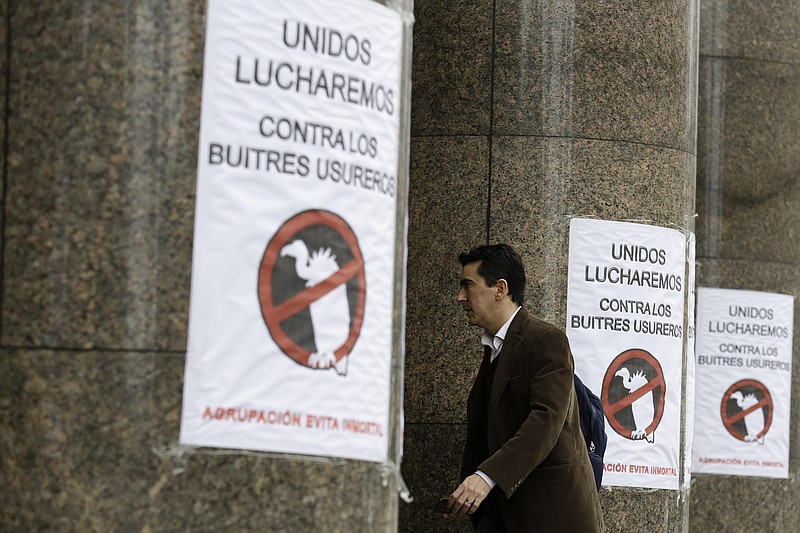BUENOS AIRES, Argentina (AP) - Like a dark cloud, the bitter fight between Argentina and a group of holdout creditors in the U.S. has hung over South America's second largest economy for years, preventing the country from accessing international credit markets.
The dispute pits creditors led by U.S. billionaire Paul Singer against Argentine President Cristina Fernandez, who has refused to pay the $1.5 billion owed to hedge funds she refers to as "vultures." A U.S. district judge's rulings in favor of the hedge funds have put Argentina in default, scaring off would-be investors and forcing the country to search for money in unorthodox places.
For Fernandez, who along with her late husband and predecessor Nestor Kirchner helped lead the country after a devastating financial crash in 2001, the issue has been a deeply personal fight and she has taken a tough approach, including a refusal to even engage in talks over the last year.
But many people think her successor being chosen in the Oct. 25 presidential election will feel compelled to resolve the standoff.
"There are big incentives for the next president to resolve this because the government needs foreign funding," said Gabriel Torres, a senior credit officer for Moody's Investor Services in New York. "For years, it's been clear that deep down the current administration didn't care about this."
A cash crunch would be the biggest prod for clearing up the conflict, analysts say. Argentina has about $27 billion in foreign reserves, relatively low for such a large economy in which the government offers generous subsidies.
The governing party's presidential candidate, Daniel Scioli, governor of Buenos Aires province who leads in the polls, has taken up Fernandez's hard line, yet he is also promising to find a solution. Economists on his team have made clear that Argentina will have problems raising money until the dispute is settled. His main opponent, outgoing Buenos Aires Mayor Mauricio Macri, has vowed to negotiate a resolution.
While the candidates remain vague, there are several ways the spat could be resolved. As part of a deal, Argentina could get loans on preferential terms to pay creditors off in lump sums. The country could also simply reissue the debt with new bonds at higher rates.
Still, many Argentines believe the country has been unfairly picked on, which means candidates have to talk tough when it comes to the holdouts, notes Roberto Bacman, director of the South American research firm Center for Public Opinion Studies.
The dispute goes back to Argentina's $100 billion default on its debts in late 2001. In 2005, and then again in 2010, most of the country's creditors accepted lower-yield bond swaps. But a group led by Elliot Management refused and sued Argentina in New York federal court. Elliot officials declined to comment on the conflict.
A familiar pattern has subsequently emerged: U.S. District Judge Thomas P. Griesa rules against Argentina, often raising the stakes, such as recently opening the door for Argentine assets in the U.S. to be seized. Economy Minister Axel Kiciloff accuses Griesa of overstepping, and Argentina ignores the rulings.
Largely cut off from international loans, Argentina has turned to countries such as China for backdoor ways to get desperately needed financing. In the last two years, Argentina has signed several agreements with the Asian powerhouse, including multibillion-dollar infrastructure projects and a currency swap.
Fernandez has touted the deals, but the terms have never been made public, and analysts have little doubt China exacts a price far more than the roughly 3 percent interest rate currently available in international loan markets.
"It's the equivalent of somebody going for a payday loan," said Brett House, a former IMF economist who is chief economist at Alignvest Investment Management, a Toronto-based investment firm. "Argentina is mortgaging the future" with such deals.
From the outside, the solution seems obvious: negotiate a deal and move beyond the stalemate. But inside Argentina, a country rich in natural resources with a long history of booms and spectacular busts, it's a political land mine.
Macri learned that the hard way. In June 2014, long before becoming a presidential candidate, he said: "We must go, sit down with Judge Griesa and do what he says."
Macri was roundly criticized, and now rarely talks about the matter on the campaign trail. When he does, he promises to be a tough negotiator who will not simply pay an "unjustified" sum.
There are other considerations, such as the "me, too" holders of about $5.4 billion in defaulted debt, a second group that has taken Argentina to court. In June, Griesa ruled Argentina also must pay them before paying its majority creditors, a decision that an appeals court threw out in August. Still, they and other holdout creditors will probably have to be included in an eventual deal.
Torres, at Moody's Investor Services, says that Argentina's outstanding debt is relatively small for an economy estimated at $600 billion and that the country is capable of paying it. Until it's paid off, Argentina won't be able to get loans on good terms and will struggle to attract foreign investors.
"Reaching an agreement with the holdouts has some costs, but not doing so has huge costs," Torres said.
